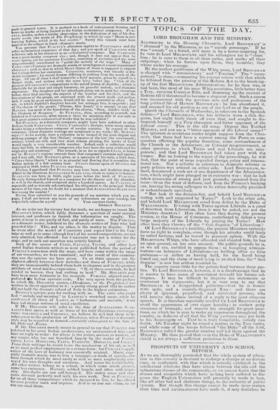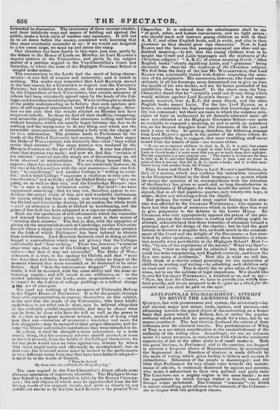PROSPECTS OF UNIVERSITY AND SCHOOL REFORM.
As we are thoroughly persuaded that the whole system of educa- tion in this country is destined to undergo a change at no distant time, in conformity with that which is actually exhibited in the intellectual relations that have arisen between the idle and the industrious classes of the community, so we cannot doubt that the abuses and anomalies which have so long been suffered to dis- grace the English Unisersities will presently be made to bow, like all other bad and obstinate things, to the authority of public opinion. But though this change cannot be made more certain than time and circumstances have made it, it may doubtless be
forwarded by discussion. The inveteracy of those corrupt citadela, and their indefinite ways and means of holding out against the public, make a brisk style of warfare very necessary. It will not do to sit down before the enemy, contented with knowing that they must eventually surrender to us : if we would not languish in a ten years siege, we must up and storm the camp. Our attention has been drawn to this topic just now, partly by the debate in the House of Lords on Monday, on Lord RADNOR'S inquiry relative to the Universities, and partly by the subject matter of a petition argued in the Vice-Chancellor's Court last Saturday, in which the state of the Highgate Grammar School is sought under notice.
The conversation in the Lords had the merit of being charac- teristic—it was full of evasion and insincerity, and it ended in nothing. The reader may remember that Lord RADNOR moved in the last session for a Committee to inquire into the University Statutes; but withdrew his motion, on the assurance given him by the Chancellors of both Universities, that certain measures of reform had been voluntarily agreed upon by the heads of the Col- leges, and were then in actual progress. We never thought so meanly of the public understanding as to believe that such specious pro- mise of self-imposed amendment could find a single dupe; there- fore we are sure that the results elicited on Monday last have surprised nobody. In them we find all that shufiling, tampering, and miserable pettifogging, all that strenuous trilling and bustle without business, which are usually begot between the fear to do nothing and the repugnance to do any thing, and which arc the
invariable consequences of intrusting a body with the charge of its oa n reformation. The promise made to Parliament by the heads of the Oxford University last session, through their organ the Duke of WatsiNGTON, was distinctly this—that "they would revise their statutes." The same promise was tendered by the Marquis CAMMN on the part of Cambridge. A year has elapsed since that promise was made ; and now we find this "revision of the statutes" resolved into the single act of discontinuing an old form observed at matriculation. For any thing beyond this, it
appears, there has not beets time. We are comforted, however, by the two noble Chancellors with the new assurance—that one Col- lege "is considering," and another College is " willing to consi- der," and a third College "expresses a readiness to take into its consideration," and so foith ; and the Oxford Duke says " they are going on as well as they can," and the Cambridge Marquis says "h is sure a strong inclination exists." But bold !—we have suppressed something : that we may not, therefore, appear to un- derstate the actual fruits of this new and wonderful enthusiasm for refoim which has been a whole year warming the breasts of the Oxford and Cambridge doctors, let us confess the whole truth —yea! an alteration is made at Oxford in hairdressing, and the name of fool-ball has been subjected to a rigorous examination. Such are the specimens of self-reformation which the venerable and learned fathers have given us, and such is their notion of "revising their statutes." The fact is, that, with the exception of giving up the matriculation-oath at Cambridge, neither University has yet taken a single step towards redeeming the solemn promise on the faith of which Parliament has been induced to abstain from interference. Lord RADNOR declared, (and in doing so chal- lenged a contradiction which was not given,) that the Colleges individually had" done nothing." There was, however," a rumour some time ago, that one of the Colleges had made an effort at rrfarm —but that it was not successful." The Duke of War.- LINGTON, it is true, in his apology fur Oxford, said that " more was dune than had been mentioned;" but, either he forgot at the moment wherein this more consisted, or he disdained to be satis- factory. And "here the conversation dropped." Next year, no doubt, it will be resumed, with the same ability and the same in- teresting results ; and will reveal to our edification, an to the perfect satisfaction of the Lords, some magnanimous c,..o.ession in regarl to the fushion of college puddings or a radical change n the a sr of nine-pins.
We need say nothing of the prospects of University Reform in the Upper House of Parliament. It is for the people, through their own representatives, to express themselves on this subject, to the end that the heads of our Universities, who have kindly undertaken to see what can be done, way be relieved altogether of this evidently painful responsibility, and may be shown what can be shone, by those who have the will as well as the power to do it ; that so our great national schools, instead of being what now they are--nurseries of aristocrat:c insolence and nests for holt sluggards—may be restored to their proper character, and be- come the liberal and catholic institutions they were intended to be.
11, indeed, it shall be thought a more convenient, or a more seemly thing, that the necessary reforms should proceed, or seem at least to proceed, from the heads of the Colleges themselves, we for our pails would raise no voice against any scheme by which that bjcct might really and effectually be accomplished; but, in that case, the reverend actors must be invited to the performance in ve y diftinent terms from any that have been hitherto adopted— it must be in the words of Goneril,
"Times be desired
By them who else will tulle She thiny they beg."
The case argued in the Vice-Chancellor's Court affords some pleasant specimens of ingenious absurdity. The Highgate Gram- mar School is a charity, founded in 1363, by Sir ROGER CHOLME• LEY ; the real objects of which may be apprehended from the fol- low jug +voids of the original sta!ute, and quite as clearly by any iodifte.ent reat'er as by time late Lord ELDON or the present Vice- Chancellor. It is ordered that the schoolmaster shall be one "of good, sober, and honest conversation, and no light person ; who should teach and instruct young children as well in their A. B, C, and other English books, and to write, and also in their grammar as they should grow ripe thereunto." Now, to Lord ELDON and the lawyers this passage conveyed one clear and un- doubted meaning,—to wit, that the young children were to be taught the Greek and Latin languages and the evidences of the Christian religion! "A, B, C," of course meaning Greek," other English books " clearly signifying Latin, and" grammar" being obviously the short for the evidences of the Christian religion. We find from the diary of the late Mr. WILBERFORCE, that Lord ELDON was continually visited with doubts respecting the accu- racy of his judgments. His successors, however, who tread super- stitiously in all his footsteps, seem determined not to give us even the benefit of his own doubts, and are far better persuaded of his infallibility than he was himself. In the above case, the Vice- Chancellor found that be" certainly could not do any thing which would militate against Lord ELDON'S decree ;" so it was unani- mously resolved, that A, B, C, did mean Greek, and the other English books meant Latin. For the late Lord ELDON, as a lawyer, we entertain the highest respect that knowledge and abi- lity can command; but there are cases in which the common prin- ciples of logic as understood by all decently-educated men—all men not educated at the Highgate Grammar School—are quite as available to expound a meaning, ay and to settle an argument too, as the deepest draughts from the fountains of the law; and such a case is this. In quoting, therefore, the following passage from Lord ELDON'S speech in the matter of the above school, we must respectfully beg to suggest, that more twaddling stuff never issued from the mouth of man—nor woman either.
"If you are to instruct children in their A, B, C, it is said, that cannot possibly mean that they are to be taught to read Livy and Virgil, and other Latin or Greek book.; it must mean that you are to teach them their alphabet. But the expression is a very singular one. 'The master is to instluct the bop in their A, B, C, and other English books,' make it clear (and we know in point of fact it was so) that the A, B, C, meant a book ; and it is often men- tioned along with another book, the Primer."
Ergo, Latin and Greek This is Lord Ennox's justification, in fact, of a system, which now confines the instruction receivable in the Grammar School to the dead languages,—a system which (to merge the question of its correspondence with the intention of the founder) has given so much and so long dissatisfaction to the inhabitants of Highgate, for whose benefit the school was de- signed, that in all that populous quarter, only twenty-two boys, it seems, derive any advantages from the charity.
But perhaps the rarest and most capital fooling on this occa- sion was afforded by Sir CHARLES WETHERELL ; who appears to have lost that degree of acuteness which in better days was wont to give poignancy to the debates in the Lower House. Sir CHARLES, who very appropriately opposed the prayer of the peti- tioners praying that instruction in reading and writing might be allowed, acknowledged that those branches of education formed a principal part of the design of the charity ; but he had the good fortune to discover a singular fact, no doubt much to the astonish- ment of the Court and the delight of the Governors—a fact over- looked by other speakers,—namely, that these branches of educa- tion actually were provided for in the Highgate School! How ?- why, "by one of the regulations of the master." What was that?— why this, " that no boy should be admitted into the school who could not write conmetentls read English correctly, and knew the first two rules of arithmetic." Now this is what we call fun. Only think of a charity school providing for the instruction of children in reading and writing—by admitting such children only as read and write. This is surely the ne plus ultra of the inge- nious, not to say the sublime of legal impudence. We should like to owe Sir CHARLES WETHERELL a hundred or so, and to say- " Now, my dear Sir Charles, we have to provide you with4k hun- dred pounds, and we are prepared to do it—give us a check for the amount and you shall be paid on the spot."



























 Previous page
Previous page